Table of Contents
Get started with MyPerfectResume today!
- Build a resume on any device
- Pick an ATS-friendly template
- Tailor with AI copy suggestions
Why this resume works
- Quantifies accomplishments: By mentioning how they managed 20 ICU patients weekly and improved recovery rates by 15%, the applicant shows the extent of their contributions.
- Uses action-oriented language: Using action verbs like “managed,” “led,” and “trained” in work descriptions, the applicant conveys a proactive approach.
- Highlights industry-specific skills: Critical care expertise is showcased through skills such as medication administration and ICU procedures, aligning with essential nursing skills for specialized roles.
More Intensive Care Nurse Resume Examples
Explore these intensive care nurse resume examples to see how to effectively highlight your critical care expertise and patient management skills. Use these examples to help you craft a resume that emphasizes your experience in high-pressure healthcare environments.
Entry-level intensive care nurse
Why this resume works
- Effective use of keywords: Strategically weaving in keywords like “critical care” and “ICU procedures” improves this resume’s ATS performance, making the applicant more visible to recruiters.
- Places contact information prominently: A professional resume header is essential for callbacks, providing quick access to contact information and establishing credibility right from the start.
- Centers on academic background: Highlighting two advanced degrees in nursing emphasizes a solid academic foundation, important for those early in their nursing career.
Mid-level intensive care nurse
Why this resume works
- Points to measurable outcomes: By implementing care protocols that improved recovery by 20% and reducing medication errors by 30%, the applicant clearly communicates a commitment to measurable improvements in patient outcomes.
- Includes a mix of soft and hard skills: The applicant balances advanced critical response with interpersonal skills, showcasing an ability to optimize patient care through both technical expertise and effective team collaboration.
- Demonstrates language abilities: Language skills in Spanish and French empowers the applicant to engage effectively in cross-cultural healthcare environments.
Experienced intensive care nurse
Why this resume works
- Lists relevant certifications: Listing certifications like CCRN and BLS effortlessly supports the applicant’s expertise in critical care, showing a strong commitment to professional growth.
- Showcases impressive accomplishments: With impressive accomplishments such as improving recovery rates by 20%, the applicant clearly demonstrates senior-level performance and compelling contributions to patient outcomes.
- Sections are well-organized: The resume’s use of clear headers and concise bullet points helps highlight key achievements, ensuring it’s easy for readers to quickly grasp the job seeker’s strengths.
Intensive Care Nurse Resume Template (Text Version)
Jin Lee
Parkview, MO 64161
(555)555-5555
Jin.Lee@example.com
Professional Summary
Experienced ICU nurse enhancing patient outcomes. Proven leadership and team management in high-pressure situations. Expert in critical care procedures and patient safety.
Work History
Intensive Care Nurse
Riverside Medical Group – Parkview, MO
September 2021 – August 2025
- Managed 20 ICU patients weekly
- Improved patient recovery by 15%
- Reduced medication errors by 25%
Critical Care Nurse
Greenfield Hospital – St. Louis, MO
June 2016 – August 2021
- Led a team of 8 nurses
- Decreased infection rates by 20%
- Trained 30 new staff yearly
Registered Nurse
Harmony Health Center – St. Louis, MO
April 2014 – May 2016
- Assessed 50 patients daily
- Enhanced patient satisfaction by 30%
- Developed recovery plans for 40%
Languages
- Spanish – Beginner (A1)
- French – Intermediate (B1)
- Mandarin – Beginner (A1)
Skills
- Patient care management
- Critical thinking
- Time management
- ICU procedures
- Medication administration
- Communication skills
- Team leadership
- Emergency response
Certifications
- Certified Critical Care Nurse – American Association of Critical-Care Nurses
- Advanced Cardiovascular Life Support – American Heart Association
Education
Master of Science in Nursing Critical Care Nursing
University of Pennsylvania Philadelphia, PA
May 2014
Bachelor of Science in Nursing Nursing
Boston College Boston, MA
May 2012
Related Resume Guides
- Geriatric Nurse Practitioner
- Hemodialysis Nurse
- Labor And Delivery Nurse
- Licensed Practical Nurse
- Neonatal Intensive Care Unit Nurse
- Neonatal Nurse
- Nurse Aide
- Nurse Care Coordinator
- Nurse Practitioner
- Nursing Assistant
- Obgyn Nurse
- Oncology Nurse
- Operating Room Nurse
- Pediatric Nurse
- Perioperative Nurse
- Pre Post Op Nurse
- Private Duty Nurse
- Registered Nurse
- School Nurse
- Trauma Nurse
Advice for Writing Your Intensive Care Nurse Resume
Learn how to write a resume for an intensive care nurse role that highlights your specialized skills and experience in critical care, ensuring your dedication to patient well-being shines through to make your application stand out in the healthcare field.
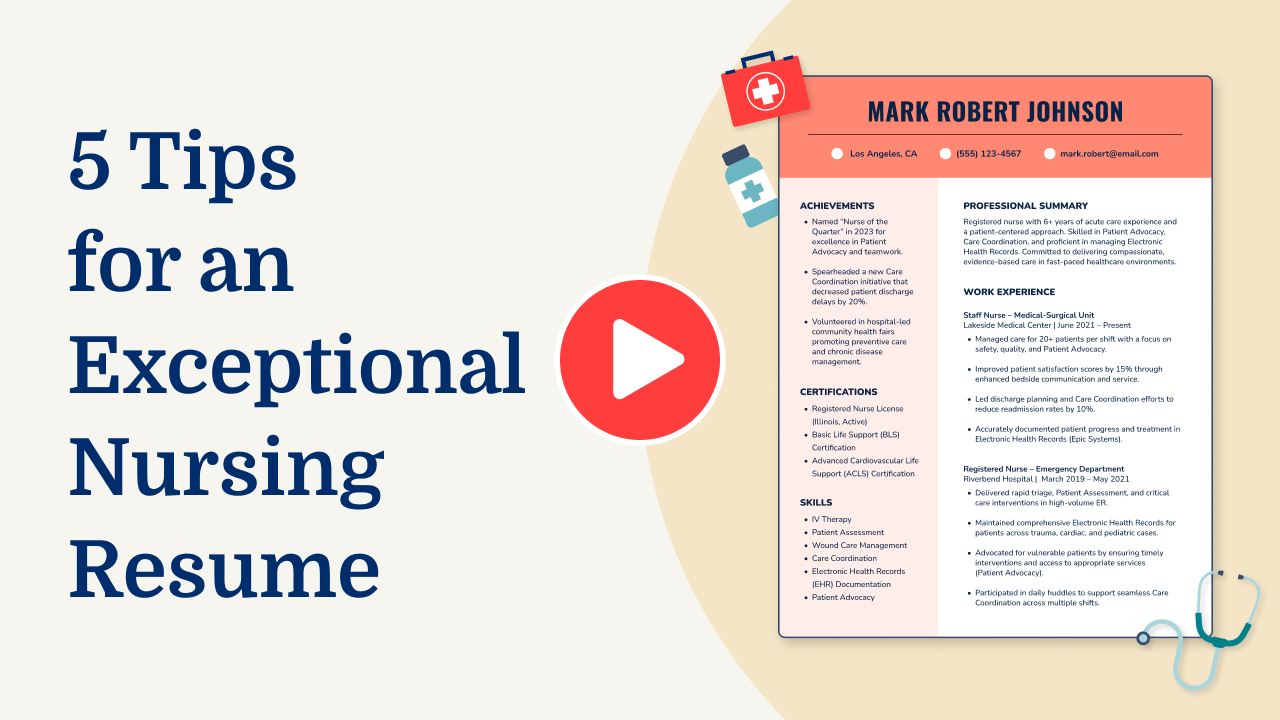
Write a strong professional summary
A professional summary on a resume introduces you to hiring managers, giving them a quick snapshot of who you are professionally. It’s the first thing they see, helping them decide if they should keep reading. You can choose between writing a summary or an objective for this section, depending on your background and career goals.
A professional summary is usually three to four sentences long and highlights your experience, skills, and achievements. It’s best suited for applicants with some work history who want to showcase their professional identity and value quickly. This section says, “Here’s what I’ve accomplished,” which helps experienced intensive care nurses stand out.
Conversely, a resume objective focuses on stating your career goals. It is ideal for entry-level job seekers, those switching careers, or people with gaps in their work history. This introduction communicates “what I aim to contribute” rather than past achievements.
Next, let’s look at examples of both summaries and objectives across various levels of experience to guide you further.
Intensive care nurse resume summary examples
Entry-level
Recent Bachelor of Science in Nursing graduate with a concentration in critical care nursing. Completed clinical rotations in intensive care units, gaining exposure to patient monitoring and emergency response protocols. Certified as a Registered Nurse (RN) and Basic Life Support (BLS) provider. Eager to contribute compassionate care and support the healthcare team in delivering high-quality critical care.
Mid-career
Skilled intensive care nurse with over seven years of experience in high-acuity hospital settings. Proficient in managing ventilated patients, administering medications, and collaborating with medical teams for optimal patient outcomes. Holds certifications such as Advanced Cardiovascular Life Support (ACLS) and Critical Care Registered Nurse (CCRN). Known for strong analytical skills and dedication to continuous improvement in patient care processes.
Experienced
Veteran intensive care nurse with more than 15 years of experience specializing in cardiac and trauma ICU environments. Expertise includes leading nursing teams, implementing advanced life-saving interventions, and mentoring junior staff members. Board-certified CCRN with a commitment to advancing nursing practices through evidence-based research and quality improvement initiatives. Recognized for exceptional leadership abilities and contributions to multi-disciplinary team successes.
Intensive care nurse resume objective examples
Recent graduate
Compassionate and detail-oriented recent Bachelor of Science in Nursing graduate eager to start a career as an intensive care nurse. Looking to use acquired skills in patient monitoring, critical thinking, and collaborative teamwork to provide exceptional care in high-pressure environments.
Career changer
Dedicated healthcare professional transitioning into intensive care nursing with extensive experience in emergency medical services. Seeking to leverage strong skills in patient assessment and crisis management to support a multidisciplinary team and improve the quality of patient outcomes in critical care settings.
Specialized training
Registered nurse with specialized training in trauma nursing and advanced cardiac life support aiming to join a leading hospital’s intensive care unit. Committed to applying advanced clinical knowledge and technical expertise towards improving patient recovery rates through evidence-based practices.
Craft a standout resume quickly! Our Resume Builder helps you highlight your skills and experiences as an intensive care nurse, making it easier to impress employers.
Include relevant certifications and training
Listing certifications for an intensive care nurse is important because it shows you have special skills needed to handle critical patients. Certifications and licenses ensure that you can provide high-quality care in high-pressure situations.
Having these credentials makes you stand out and shows your dedication to learning more in your field. A separate certifications section on your resume makes it easy for employers to see your qualifications right away. Helpful certifications for intensive care unit nurses include:
- Critical Care Registered Nurse (CCRN)
- Advanced Cardiovascular Life Support (ACLS)
- Basic Life Support (BLS)
- Pediatric Advanced Life Support (PALS)
- Trauma Nursing Core Course (TNCC)
These certifications show that you are ready to work in intensive care, where every moment counts. They give employers confidence that you’re skilled and up to date with the latest practices. Including them on your resume can help you succeed in getting the job you want.
Example of a certifications section
Critical Care Registered Nurse (CCRN)
Issued by: American Association of Critical-Care Nurses (AACN)
Advanced Cardiovascular Life Support (ACLS)
Issued by: American Heart Association
Pediatric Advanced Life Support (PALS)
Issued by: American Heart Association
Basic Life Support (BLS) for Healthcare Providers
Issued by: American Heart Association
Trauma Nursing Core Course (TNCC)
Issued by: Emergency Nurses Association (ENA)
For nursing roles, choose a resume template with a simple, professional design rather than an overly decorative one. This approach ensures you present a polished image that can set you apart.
Showcase your work experience
Showcasing relevant work experience on your resume is key to standing out as an intensive care nurse. Employers want to see your past roles and accomplishments to understand how you can contribute to their team.
Start by listing your work experience in reverse-chronological order, meaning the most recent job comes first. Each entry should have your job title, employer name, location, and employment dates. This structure makes it easy for hiring managers to follow your career path and see your growth over time.
Use clear, action-oriented language when describing what you did in each role. Instead of just listing duties, highlight specific actions you took and the positive outcomes that resulted. For example, use phrases like “managed a team,” “improved patient care,” or “reduced response times.”
Whenever possible, use numbers or measurable results to show the impact of your work. This might mean noting how many patients you cared for daily or any improvements in patient recovery rates. Include core responsibilities that showcase essential skills for an intensive care nurse, such as:
- Monitoring vital signs
- Administering medications
- Providing emotional support to families
- Collaborating with doctors for treatment plans
By clearly detailing these experiences and achievements using straightforward language and quantifiable results, you’ll help potential employers quickly grasp why you’re a great fit for their team.
5 intensive care nurse work history bullet point examples
- Administered critical care to 15+ patients daily in a high-pressure ICU environment, improving patient recovery rates by 25%.
- Implemented new medication protocols that reduced adverse drug reactions by 10% over a six-month period.
- Trained and mentored 10 junior nurses, improving team efficiency and reducing onboarding time by 20%.
- Collaborated with multidisciplinary teams to develop personalized care plans, increasing patient satisfaction scores by 30%.
- Used advanced monitoring equipment to accurately assess patient conditions, leading to a reduction in emergency interventions by 15%.
An intensive care nurse should use a resume format that emphasizes clinical expertise, patient care achievements, and ability to thrive in high-pressure environments.
Match your resume with the job description
Tailoring your resume to the job description is essential because it helps you stand out to employers and pass through applicant tracking systems (ATS). ATS scans resumes for specific keywords and phrases from job postings, so matching your resume to the job description increases your chances of being noticed.
An ATS-friendly resume includes keywords and phrases that match your skills with those in the job description. This approach can help you get noticed by hiring managers since it shows that you meet the required qualifications for roles like an intensive care nurse.
To identify keywords from job postings, look for skills, qualifications, and duties mentioned repeatedly. For example, terms like “patient care,” “clinical assessments,” or “healthcare team collaboration” are important. Using exact phrases from the posting ensures your resume aligns well with what employers are seeking.
Incorporate these terms naturally into your resume content. For instance, instead of saying “Provide high-quality patient care,” you could write “Delivered high-quality patient care to improve overall health outcomes,” which more closely matches potential job descriptions.
Customize your resume to improve ATS compatibility by ensuring that your application reflects what employers are actively looking for in applicants.
Make sure your resume gets noticed with our ATS Resume Checker, which quickly finds areas to improve and boosts your chances of getting through the system.
FAQ
Do I need to include a cover letter with my intensive care nurse resume?
Including a well-written nursing cover letter with your resume can help you stand out from other applicants and secure more interviews.
A cover letter lets you highlight your passion for intensive care nursing, demonstrate relevant clinical expertise, and explain why you’re an excellent fit for the healthcare team.
If the hospital emphasizes teamwork in critical care or has Magnet status, detail how your skills align with their values and goals.
You can use our Cover Letter Generator to quickly craft a polished cover letter tailored to the role while focusing on essential keywords and accomplishments.
For specific guidance, review an intensive care nurse cover letter to see how to showcase your skills effectively.
How long should a intensive care nurse resume be?
For an intensive care nurse, a one-page resume is often sufficient if you are early in your career or have fewer roles to detail. This format helps highlight important skills like patient care, critical thinking, and experience with medical technologies efficiently.
However, if you’ve accumulated extensive experience or possess specialized certifications in critical care, a two-page resume might be more appropriate. It allows you to showcase significant accomplishments and responsibilities without omitting key details relevant to the role.
To understand how long a resume should be and explore examples specific to your career stage, consider reviewing our detailed guide.
How do you write a intensive care nurse resume with no experience?
When crafting a resume with no experience for an intensive care nurse position, focus on emphasizing your education, any relevant skills, and training that meet the demands of the role.
- Emphasize educational background: Start by listing your nursing degree prominently. Include details like the institution name, graduation date, and any honors or distinctions received. Don’t forget to add your RN licensure and certifications specific to critical care like ACLS.
- Leverage clinical rotations: Treat clinical rotations as valuable hands-on experience. Detail each rotation, focusing on ICU-specific tasks such as monitoring vital signs, patient assessments, or using advanced medical equipment.
- Showcase transferable skills: Highlight skills gained through volunteer work or part-time roles in healthcare settings. Skills such as teamwork, communication under pressure, and empathy are important for intensive care environments.
Check out resources on crafting a resume with no experience for further guidance and examples tailored to new graduates entering specialized fields like intensive care nursing.
Rate this article
Intensive Care Nurse
Share this page
Additional Resources
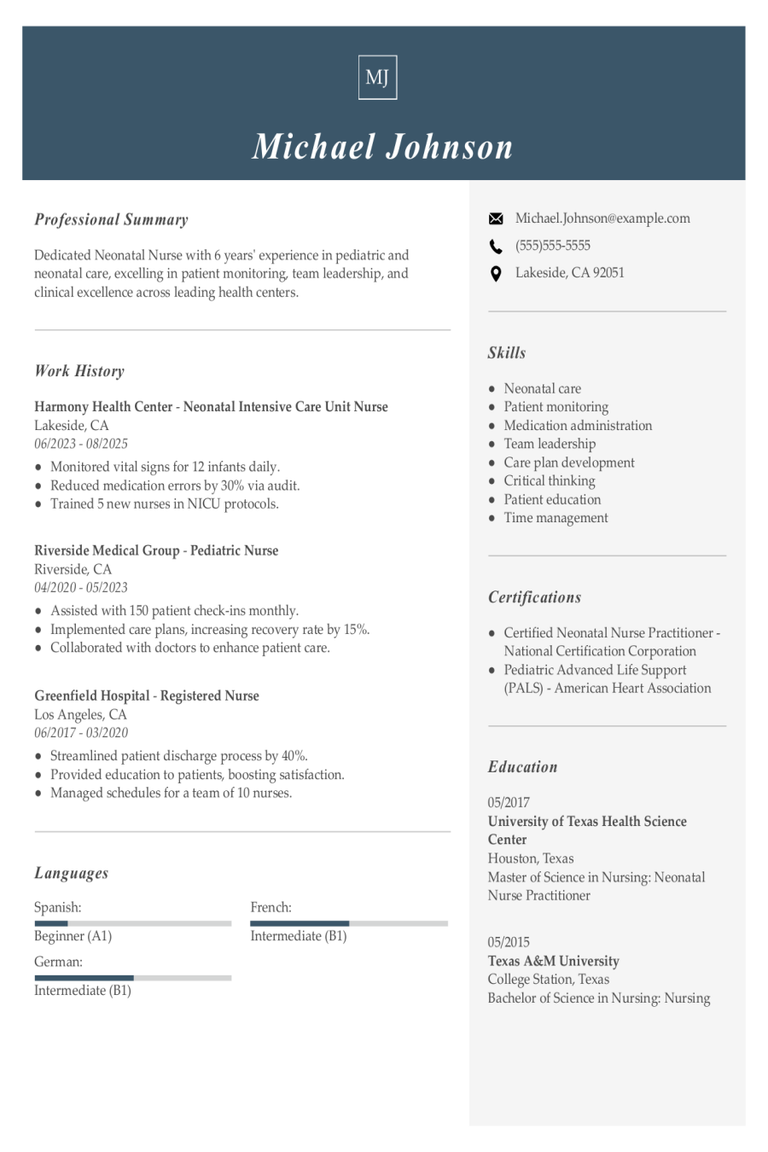
Neonatal Intensive Care Unit Nurse Resume Examples & Templates
Find great, attention-grabbing neonatal intensive care unit nurse resume examples to see how you can show your experience in caring for newborns with special needs. Learn how to highlight your

Intensive Care Unit Registered Nurse & Templates
As an intensive care unit registered nurse, you are responsible for the constant care and monitoring of people in the intensive care unit. The care that an intensive care unit

Intensive Care Nurse Cover Letter Example & Templates
The intensive care nurse operates under high stress conditions. In any intensive care nurse cover letter, you want to make it clear that not only are you experienced, but you
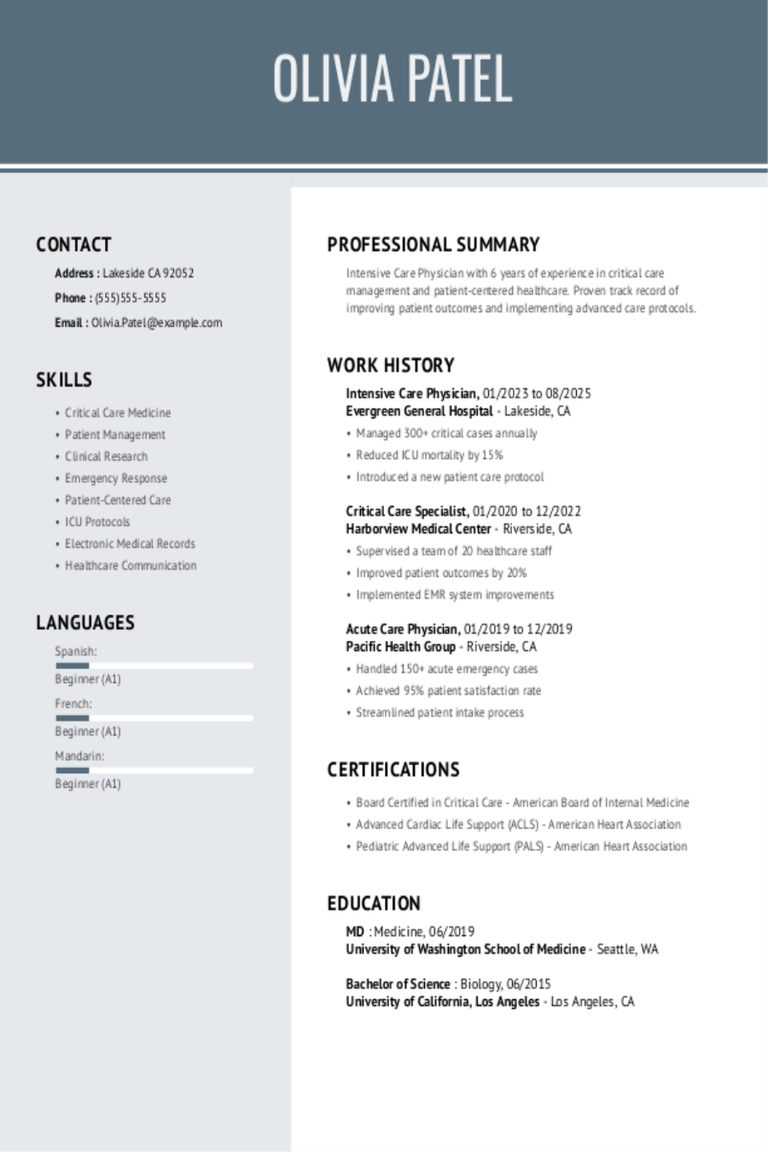
Intensive Care Physician Resume Examples & Templates
Explore intensive care physician resume examples to see how to highlight your experience taking care of critically ill patients and working with medical teams. These examples and tips help you
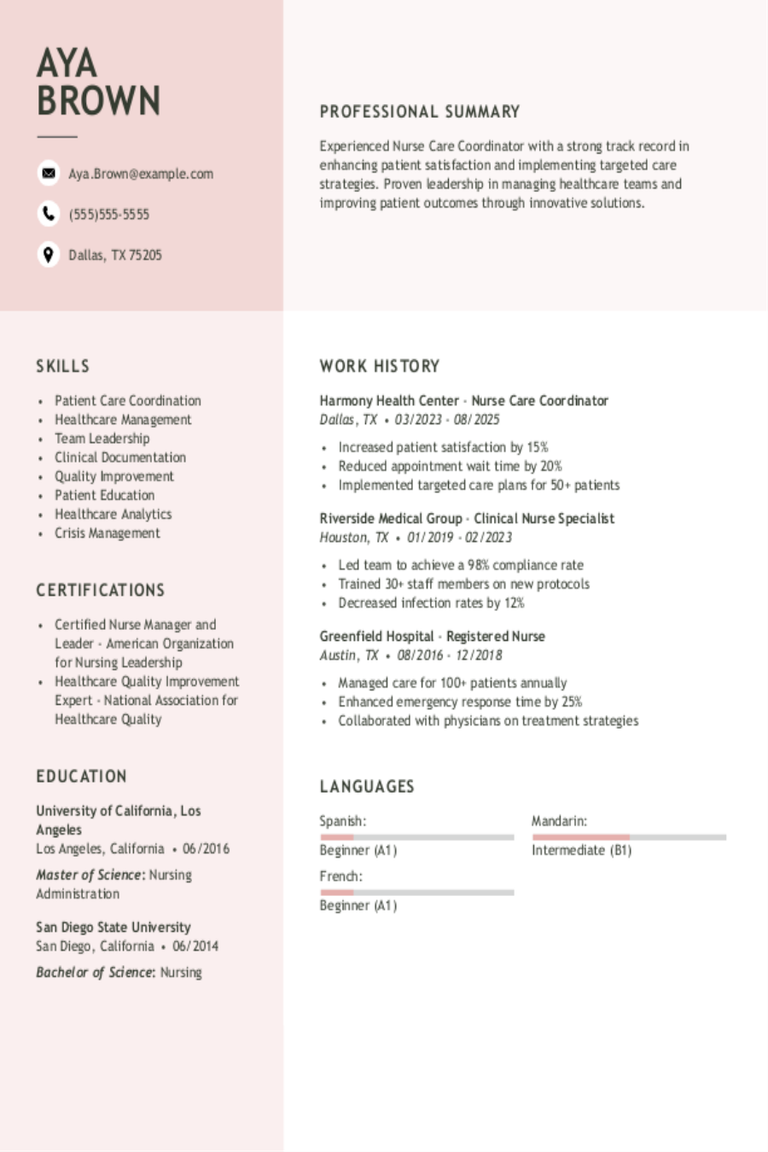
Nurse Care Coordinator Resume Examples & Templates
Discover how nurse care coordinators can showcase their skills in patient care and teamwork on a resume. Use our resume examples and tips to help you highlight your experience in
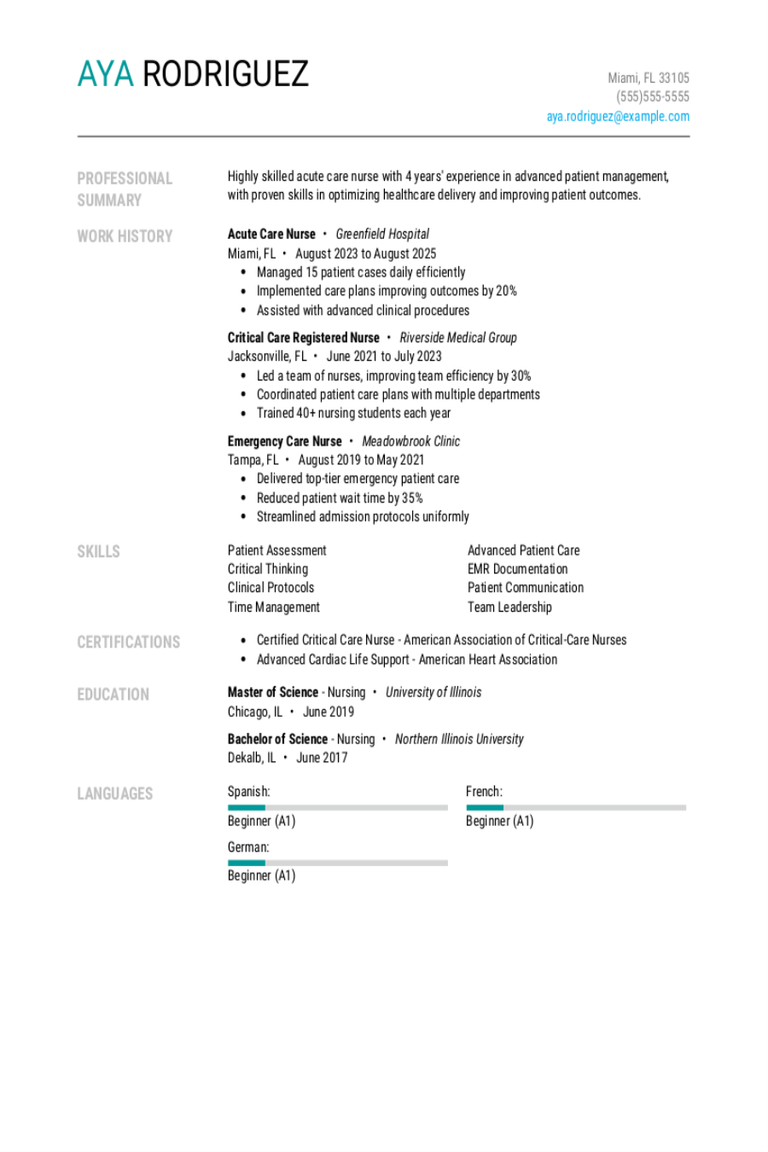
Acute Care Nurse Resume Examples & Templates
Your resume as an acute care nurse can show more than just patient care. Discover how to highlight your quick decision-making, teamwork in high-pressure situations, and ability to handle emergencies
